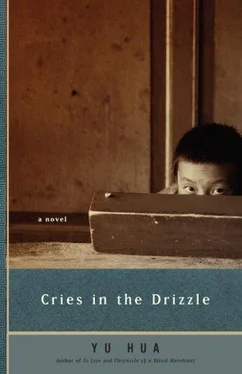One evening not long afterward, at the tail end of winter, Su Yu and Zheng Liang and I were walking along a quiet street — the first time I was with Su Yu after dark. I remember I had both hands in my pockets, through habit ingrained by the winter cold, and it was only when I realized that my palms were breaking into a warm sweat that I asked Su Yu in surprise, “Is it spring already?”
I was fifteen that year, and to be going around with two friends considerably older than me was a memorable experience. Su Yu was on my right, his hand on my shoulder. Zheng Liang— my companion for the first time — was on his right. When Su Yu introduced me, Zheng Liang did not think any the worse of me for my shortness and even seemed pleased, saying to Su Yu, “Did you think I don't know who he is?”
Zheng Liang made a deep impression on me that evening. He had a way of swinging his arms as he walked, and in the moonlight his tall figure conveyed an air of complete self-assurance. It was on that occasion that the three of us quietly addressed the topic of masturbation. Su Yu, normally so laconic, was the one who started things off, and I was quite taken aback when he calmly broached the subject. It is only now, when I recall this scene after an interval of so many years, that I understand Su Yu's intentions. At the time I had yet to shake off all the baggage I had accumulated, and Su Yu brought the issue out in the open to help me put it in perspective. And it is true that only after this did I become truly relaxed about it. Now, as then, I feel there was something touching about the conspiratorial tone of the confidences we shared.
Zheng Liangs attitude was matter-of-fact. “If you can't sleep at night, it really does the trick,” he said.
Recalling how cruelly I had been punishing myself just a few days earlier, I shot him an admiring glance.
Although on that particular evening he put me entirely at ease, a casual remark of his somewhat later on created a new matter for concern. Zheng Liang, quite unaware that he was revealing his own ignorance, said to me, “That stuff is like water in a thermos — there's only so much of it in you. People who use it up quickly exhaust their supply by the time they're in their thirties, whereas people who save it up still have some when they're eighty.”
This comment sent me into a tizzy. Given my overindulgence during the preceding weeks, I thought it very likely that my stocks had been drained dry, and I was worried sick at night when I contemplated my future. As fear gnawed away, my romantic yearnings failed to reignite those fantasies that once kept me in their thrall and instead I became increasingly resigned to a life of loneliness. One evening I imagined myself as a doddery old man plodding alone through the winter snow, and I felt heartsick over my wretched lot.
For many nights after this I continued my nocturnal activities — not to satisfy physical urges but to determine the status of my bodily functions. Successful experiments gained me only momentary reassurance, for panic followed hard on their heels. I was well aware of the risks I was taking with each effort at verification and that the very last drops of fluid had just been discharged. Then I would bitterly regret the proof I had just completed. But within days anxiety about the prospect of internal depletion would stir me to renewed testing. My physical growth took place against the backdrop of a wan complexion, and often I would stand next to the pond in Southgate, looking at my reflection. I saw my emaciated chin and lackluster eyes drifting helplessly in the water, and faint ripples made me see a face covered in wrinkles. Especially when the sky was overcast I could clearly make out the gloomy features of a man grown senile before his time.
It was not until I was twenty years old that I learned the truth of the matter. I was at the university in Beijing at the time and happened to make the acquaintance of a poet who then enjoyed a considerable reputation. He was the first celebrity I had known and his offhand, distracted manner inspired me regularly to take a two-hour bus trip to reach the other side of town, just to enjoy a few minutes of conversation with him. After three such visits he was still vague about what my name was, but his friendliness and his scathing mockery of fellow poets more than compensated for this indignity. Though prone to holding forth at great length, he was also capable of listening attentively to my own scattered opinions while regularly correcting what he saw as erroneous views.
At the home of this forty-year-old bachelor I would encounter women of various stripes and hues, a reflection of the poet's catholic tastes. After our relationship developed, I once rather gingerly suggested that perhaps it was time for him to get married. This intrusion into his privacy did not seem to irritate him, for he answered casually, “What's the point of getting married?”
This put me on the spot. Out of concern for him as a man I much admired, I blundered on, “You don't want to use all that stuff up prematurely.”
This bashful remark left him incredulous. “How on earth could you think like that?” he asked.
So then I repeated what Zheng Liang had said that evening years earlier. His reaction to this account was a roar of laughter, and I still remember vividly the sight of him doubled up on the sofa, splitting his sides with mirth. Later he invited me for the first time to stay for dinner, a meal that took the form of two packets of instant noodles purchased from the convenience store downstairs.
The poet did get married when he was forty-five, to a woman in her thirties whose striking good looks were paired with a remarkably fierce temper. The poet, formerly such a free spirit, now found himself the cat's-paw of fate. Like a child in the hands of a stepmother, when he left his apartment the only money he had in his pocket was his round-trip bus fare. Control of the purse strings was just one of her areas of expertise. He often came over to my place, bruises all over his face, seeking temporary refuge, the reason being simply that a certain female had called him up. A few days later he would insist that I accompany him back home as he prepared to make an official apology. I said to him, “Don't look so dejected. You've got nothing to be ashamed of. You didn't do anything wrong.”
But he smirked and said, “Better to confess my errors.”
I remember how his pretty wife, from her perch on the sofa, said to her husband as he came in the door, “Take the garbage out!”
Our poet lifted the bulging basket of trash, a beam of pleasure on his face. He was wrong to assume that performance of this chore would secure him a clean bill of health, for on his return she gave me my marching orders, and after the door had closed behind me, I heard her launch forth like a parent lecturing a child. As his wife, she was of course fully aware that the object of her reprimands was a gifted poet. So it was that I heard a tirade that left me quite dumbfounded, so wide was its lexical range, incorporating references to classical poetry and contemporary political jargon, pop lyrics, and goodness knew what else. At intervals in between I heard her husband's pious utterances: “That's well put” or “You've set me straight on that.”
As the wife's voice grew ever more passionate, she was no longer censuring her husband as much as she was carried away by a pure love of invective. I hated to imagine what it would be like to be under her thumb on a daily basis: even if one could endure the black eyes and bloody noses, it would be hard to put up with her verbal incontinence.
Her most extreme measure was to decorate their apartment with her husband's letters of repentance, pledges to reform, and statements of self-criticism, as though they were some kind of design element that would impress her husband's friends when they visited. When she first stuck them up, his face was ashen, but with time he was able to pretend it was no big deal. “A dead pig's not afraid of being scalded with hot water” was his comment.
Читать дальше












